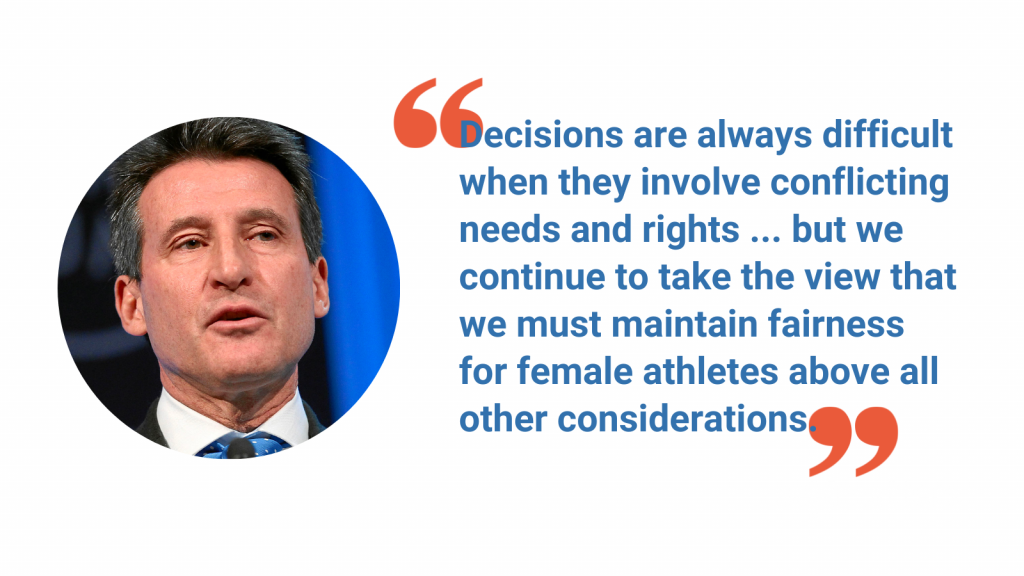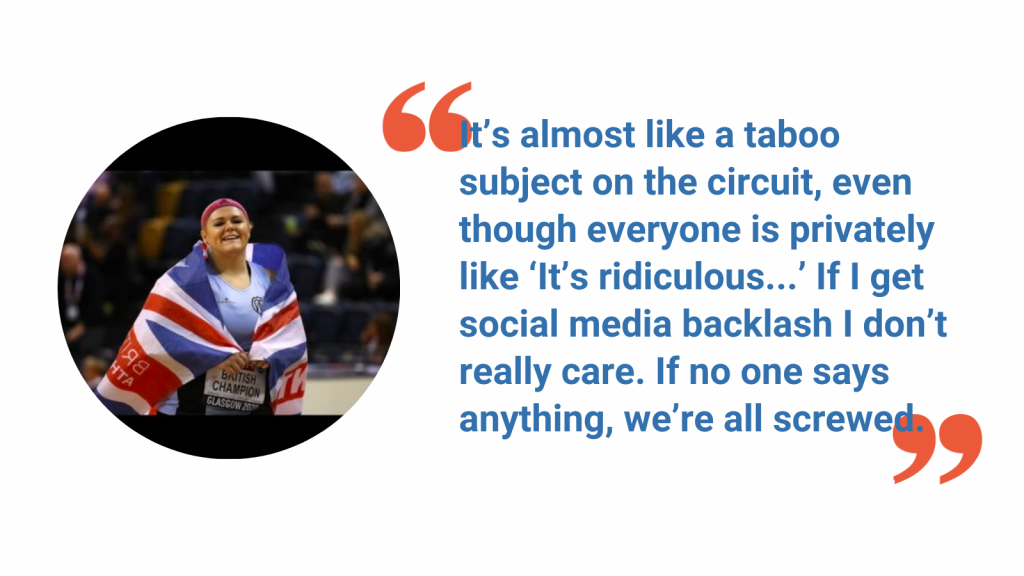Fairness matters in sport

Philosopher Dr Jon Pike has written a guest blog post for Sex Matters, based on his recent article published in the Journal of the Philosophy of Sport: ‘Why “Meaningful Competition” is not fair competition’. In that article, he sets out case for a two-category model for sport, female and open, and ends with the hope that World Athletics will find its way to this solution.
World Athletics has indeed found its way to this solution. Yesterday it announced that it will update its eligibility criteria to exclude “male-to-female transgender athletes who have been through male puberty” from female world-rankings competition.

Dr Pike’s post traces how we got here, from arguments over science to arguments over fairness, and considers whether the idea of “meaningful competition” is a good substitute for fair competition.
Why meaningful competition is not fair competition
World sport has been convulsed over the past few months – indeed years – by questions about trans athletes, especially transwomen, competing in their “acquired gender”. World Athletics had previously said its preferred option was a reduced 2.5nmol/L testosterone limit for transwomen to compete in female events. But UK Athletics had come out against that option and for a stricter eligibility rule, based on male advantage gained through puberty or androgenisation – in effect, a sex-based policy. The UK Athletics position included an odd statement claiming that it was unable to pursue this because of legal restrictions. This was quickly rebuffed by both the Government and the Equality and Human Rights Commission. UK Athletics is the “home” governing body of Sebastian Coe, the current president of World Athletics, so tensions were apparent even before the latest welcome announcement from World Athletics.
A new phenomenon has been the number of current athletes, such as shot-putter Amelia Strickler and swimmer Riley Gaines, who are prepared to argue for a sex-based policy, rather than a testosterone-level fudge. Previously, this advocacy had fallen largely to retired stars such as Martina Navratilova, Sharron Davies, and Mara Yamauchi.

Another key new development has been a sort of quietening on the scientific front. Although you still get the odd tortuous opinion piece trying to make the implausible claim that testosterone suppression can remove male advantage, most of the serious people have given up on that claim. Instead they tend to argue that, even though transwomen have residual male advantages, it can still be fair for them to compete in the female category. So the terrain has shifted, a bit, from sport science to ethics and fairness. There are still cries for “more research” but, to my ear at least, they are beginning to sound a bit despairing. I think we’re getting to a point where everyone can say that the science is settled.
Setting out the new terrain here is the International Olympic Committee, which has given its blessing to the twin ideas of “meaningful competition” and “disproportionate advantage” in its policy documents. The general idea is that if the advantage held by transwomen is sufficiently small that they won’t win all the time, then it is permissible for them to compete in the female category.
But there are at least three big things wrong with this approach, or so I’ve argued in a recent paper that criticises it. The first is that what matters about male advantage is not just its size but the kind of advantage it is. There are two types of advantage in sport: competition advantages and category advantages. Competition advantages are the sorts of things that we let play out in sport – who is the most skilful, the fastest, or the best tactician? And yes, sometimes we are interested in who has the greatest genetic gifts, like the lung capacity of Miguel Indurain or the wingspan of Michael Phelps – and what they can do with those gifts.
Category advantages, on the other hand, are those advantages that we control for by creating categories. Some of these are between sports – such as between e-bikes, motor bikes and road bikes, or between different formulae in motor sport. The more obvious ones are age categories, weight categories and sex categories. These categories exclude certain sorts of advantages by definition. That’s their point. If you want to allow those advantages, you must do away with the category itself. And since few people want to do away with women’s sport (at least explicitly), male advantage must be excluded from it. The so-called “Phelps Gambit” doesn’t work – we don’t classify for his advantages because they are competition advantages; and we do classify for male advantages because they are category advantages.
The second big mistake is that the IOC misunderstands fair competition in sport – a bold claim, I know. Fair competition doesn’t mean that no one ever dominates – think Indurain, Phelps, Navratilova and Bolt. Of course, we could organise a handicap version of every sport to allow, as near as possible, everyone to cross the line at the same time, so that who wins turns out to be arbitrary and at the whim of the handicapper. But our standard understanding of fairness in sport is a matter of processes (a level playing field) not outcomes (a photo-finish). Fairness and non-domination come apart.
The third big mistake is that motivation for this move comes from the slogan “Transwomen are women” – endorsed by Richard Budgett, the Medical and Scientific Director of the IOC. The problem here is that it’s a slogan without a theory. Supporters of Sex Matters don’t need me to present an argument against this slogan, but a weird feature of this discussion is that it’s not necessary. You don’t need, for now, to make up your mind on whether it’s true or not, because, either way, the IOC approach is wrong. If the slogan is true, then transwomen should be eligible for women’s sport without having to pass any further tests simply because they “are women”. This is the position taken by, for example, Rachel McKinnon/Veronica Ivy, who is against any “biological restrictions”. Say what you like about Ivy, but there’s a kind of consistent logic to this approach. (The consequence is, of course, the end of female sport.) If this view is right, testosterone regulations unfairly discriminate against a group of women.
But if the slogan is false (which I think it is, of course) then it’s difficult to see what motivates testosterone limits and tests, whether 10nmol/L or 5nmol/L or 2.5nmol/L, and whether for two years, three years or more. Women’s sport should be solely for women. If transwomen are not women, then there is no good reason to make an exception to permit their eligibility for women’s sport.
Having looked at the science, and worried about the logic, World Aquatics, World Rugby, British Triathlon and British Athletics (among others) have come to more or less the right conclusion.
Everyone should be welcomed into sport, of course, and everyone must have a fair category in which to compete. This can be done with a two-category model: a female category – which excludes anyone with male advantage; and an open category for absolutely anyone who wants to compete in it. (There’s a tricky issue in combat sports, because I don’t think that you can give fully informed consent to fight someone whose trans status is concealed, and fully informed consent is fundamental to the ethical grounding of combat sport.) With a few details to sort out, this is a solution for almost all athletic sports that is maximally inclusive and fair to everyone. I hope – and increasingly expect – that World Athletics will find its way to this solution.
Yesterday, announcing the decision, World Athletics president Sebastian Coe said:
“Decisions are always difficult when they involve conflicting needs and rights between different groups, but we continue to take the view that we must maintain fairness for female athletes above all other considerations. We will be guided in this by the science around physical performance and male advantage which will inevitably develop over the coming years. As more evidence becomes available, we will review our position, but we believe the integrity of the female category in athletics is paramount.”

